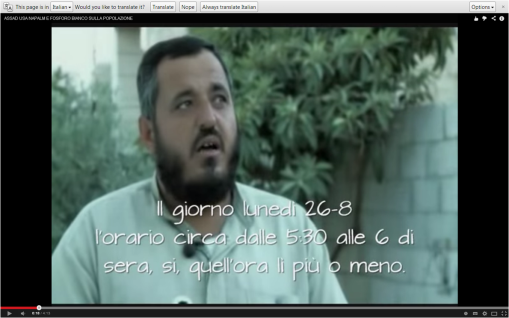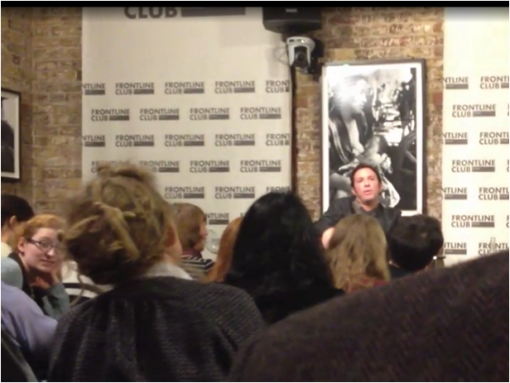See also More puzzles about BBC’s “Saving Syria’s Children” documentary , OffGuardian, 28 October 2015
Accounts of the time of the alleged napalm bomb attack span a range of six hours, from “around midday” up to 6.00pm.
A Human Rights Watch report which the BBC cited in its correspondence with me states (p12):
Around midday on August 26, 2013, Syrian government forces used incendiary weapons in an attack on a school in the town of Urm al-Kubra in northern Aleppo governorate, 15 kilometers southwest of the city of Aleppo.
The HRW report links to a report from the Violations Documentation Center in Syria (a frequent BBC source) which states (p4):
On 26 Aug 2013, at 02:00 pm, the Syrian air forces shelled ‘Iqraa’ Institution in Orm Al Kubra in Aleppo, which had been under the Free Army’s control for several months then.
The VDC report quotes activist Mustapha Haid (p5):
“At 3 in the afternoon, On 26 Aug 2013, I was in Al Atareb City and I heard rumours about a ‘chemical attack’ on Orm Al Kubra and that tens of casualties were brought to Al Atareb Hospital”
BBC reporter Ian Pannell, who fronted ‘Saving Syria’s Children’, has categorically stated in BBC Complaints correspondence that “The attack happened on the 26th of August at around 5.30pm at the end of the school day”.
When questioned about the time of the attack at an event at London’s Frontline Club on 15 October 2014, Pannell’s sole BBC colleague on ‘Saving Syria’s Children’, the programme’s cameraman, director and producer Darren Conway, responded “I would say it was around, I don’t know, between three and five, something like that”. It is unclear whether Conway was referring to the alleged attack on the school in Urm al-Kubra (Urem Al-Kubra) or to the subsequent arrival of alleged victims at the hospital in Atareb (Al Atarib) several miles away where he filmed them. [1] [2]
Alleged eyewitness Abu Yousef states in this video that the alleged attack occurred sometime between 5.30pm and 6.00pm (see screengrab below).
This Turkish article (translated here and archived here) quotes a Syrian doctor “who came to Turkey together with the wounded” as stating:
“At 6 pm yesterday evening, warplanes fired a missile and then sprayed a phosphorus bomb.”
Access to the metadata of Conway’s footage may clarify which, if any, of these competing claims can be borne out.

“The day monday 26-8 the hours of 5:30 to 6 in the evening, yes, that now they more or less.” (http://translation.babylon.com/italian/to-english/)
Notes
[1] See this privately made recording of the relevant section from the event, partially transcribed here:
Questioner: Just one small point of fact about the Panorama programme, because there’s been some variation in what time it actually happened, this playground bomb, the BBC say 5.30 at the end of the school day, Human Rights Watch in their report say it was midday and Violations Documentation Centre in Syria say 2pm and one of their correspondents said they heard about it at 3pm, so what time of day did this actually happen?
Darren Conway: Towards the end of the day, yeah, I mean I don’t remember the exact time but we were there, we only arrived in the afternoon, we were at that hospital on our way out of the country for about I don’t know, 20, 30 minutes before it happened and then it became dark not long after, so I would say it was around, I don’t know, between three and five, something like that.
It is unclear whether “between three and five” represents Conway’s assessment of when the alleged incendiary attack on the school in Urm al-Kubra took place or refers to the point at which he became aware of events from his own perspective (ie when the alleged victims began to arrive at Atareb Hospital several miles away, where he filmed them).
If the former interpretation is assumed then Conway’s account appears at best somewhat inconsistent with Pannell’s categorical statement that “The attack happened… …at around 5.30pm at the end of the school day”; if the latter, it would appear irreconcilable.
In respect of Conway’s remark that “it became dark not long after” note that sunset in Aleppo on 26 August 2013 was at 19:08.

‘Saving Syria’s Children’ cameraman, director and producer Darren Conway at the Frontline club on 14 October 2014, responding to a question about the time of the alleged 26 August 2013 “playground napalm bomb”: “It was the end of the day, yeah, I mean I don’t remember the exact time… …I would say it was around, I don’t know, between three and five, something like that.” (Footage filmed privately http://1drv.ms/1DfBr2T).
[2] To date, video of Conway’s interview has not appeared on either the Frontline Club’s website or You Tube channel, out of step with the Frontline’s practice of publishing videos shortly after events take place.
On 17 December 2014 the Frontline Club’s Programme Editor & Manager, Millicent Teasdale, responded to my email enquiries of 20 November and 8 December 2014 on this point, stating:
“A few edits have had to be made to the video for security reasons and I hope to have it online early next year.”
I attended the event, described by the host Vin Ray as “a cross between Desert Island Discs and This Is Your Life” and to my mind the discussion did not bear on any security matters.
Update 9 March 2015
The Frontline Club website now states:
The video from Darren Conway’s Reflections has not been put on the Frontline Club site to protect those colleagues whose names were mentioned that work in extremely dangerous locations. Everyone is aware of the extreme risk that journalists are facing today in places such as Syria and DC wants to do everything possible to prevent them from being put at further risk, something that we at the Frontline Club of course support. This is the only reason why DC’s Frontline Club session is being held back and, as soon as it is deemed safe for the individuals concerned, it will be made available on our site.
‘Saving Syria’s Children’ was the most recent work of Conway’s discussed at the event. To the best of my recollection, and that of others present, the only colleague other than Ian Pannell mentioned by Conway in respect of this project was Mughira Al Sharif, whom Conway referred to only as “Mughi”. As documented here, Al Sharif was publicly credited as “Fixer/Translator” on ‘Saving Syria’s Children’ and openly proclaims vehement pro-opposition sentiments on his Instagram account and elsewhere.
Furthermore, the event was live-streamed on the internet. As Conway was undoubtedly aware of this, and of the expectation that video of the event would subsequently be published on the Frontline Club’s website, is it likely that he would he have risked putting colleagues “at further risk” by naming them?

Statement published on the Frontline Club website http://bit.ly/1wlfeCU circa 9 March 2015 relating to 15 October 2014 event at which cameraman Darren Conway appeared to contradict Ian Pannell over the time of the alleged “playground napalm bomb”. Attendees at the event find the Frontline’s explanation unpersuasive.

Pingback: BBC obstinately refuses to admit they used fake footage to blame Assad’s Syria | Uprootedpalestinians's Blog
Pingback: Finally an admission from BBC that their Syria Aleppo footage was faked | Uprootedpalestinians's Blog
Pingback: War Propaganda: Fabrication in BBC Panorama “Saving Syria’s Children”: Substitution of “Napalm Bomb” Footage « Socio-Economics History Blog
Out of curiosity, what time would it get dark in that region at that time of year?
Not sure, just know Aleppo is 2 hours ahead of UK time. The sun is low in the sky in the relevant scenes of victims arriving (https://bbcpanoramasavingsyriaschildren.files.wordpress.com/2015/03/picture22.png)
Conway’s statement that “it became dark not long after” seems intuitively odd if the victims began arriving closer to 3pm.
In 2nd BBC Complaints response (http://bit.ly/1JfUqTD) Pannell wrote they were at the hospital for a “4 to 5 hour period”.
Sunset in Aleppo on 26 August 2013 was 19:08 http://www.timeanddate.com/sun/syria/aleppo?month=8&year=2013
Pingback: How the FSA/ISIS Fake Chemical Attacks to Force Regime Change | Friends of Syria
Pingback: EXCLUSIVE: One Man’s Quest to Expose ‘Absolutely Historic’ BBC Panorama ‘Fakery’ | Friends of Syria
Pingback: EXCLUSIVE: One Man’s Quest to Expose ‘Absolutely Historic’ BBC Panorama ‘Fakery’ | Tegenwicht Platform
Pingback: Does Presence of White Helmets Indicate False Flag Chemical Attacks in Syria